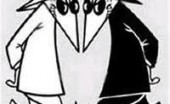Molly Minturn - My family is heartbroken to share that my father died in surgery on Monday, Feb. 10. It…
Wednesday Night #1409
Written by Diana Thebaud Nicholson // March 4, 2009 // Antal (Tony) Deutsch, Chilion Heward, Economy, Emerging markets/economies, Europe & EU, Kimon Valskakis, Markets, Reports, Ron Meisels, Wednesday Nights // 1 Comment
T H E R E P O R T
see Wednesday-Night.com for photos and video of Hans Black on the MCO Gala
It is very difficult to accept emotionally that we do not know. And WE DO NOT KNOW
Although there appears to be a common theme, the expert analyses of the current financial situation are inconsistent, controversial and somewhat reminiscent of the fable of the three blind men and the elephant as was brilliantly illustrated by Aislin’s cartoon the morning after.

Scenario 1
We are in deep trouble, the future unclear and we must view the market on a short term basis only. If the markets keep low this coming Monday, March 9, we should do better than the U.S. as Canada has energy and gold. The current euphoria arising from the belief that Canadian banks have done well so far in this recession, with Bank of Montreal shares paying ten percent, is based on a myth. The appearance of strength in the presence of an obvious recession is due mainly to the fact that BMO’s earnings include the pre-recession period in the first half of 2008. The apparent strength is unsustainable and either the stock price must rise or the yield must fall. It is important to learn the lesson from 1929 when in 1932, as the market appeared to have regained strength following the depression, investors who had been sufficiently astute to have avoided catastrophic losses in 1929, reinvested in 1932 in the belief that recovery had begun, losing heavily.
Scenario 2
The market is in a downward spiral in which neither the breadth nor depth is predictable. In view of the lack of confidence, it is certain that no recovery can be anticipated in 2009. The current recession in the west is seriously affecting exports from China and Taiwan, sending those as well as other East Asian countries into a depression, leading to civil unrest and possibly, revolution.
Meantime, there are other, geopolitical, issues that are being largely ignored and make prediction of the economy impossible. One expert points to the situation in Ukraine that “could explode within a week. Russia will then turn off the gas and Europe will suffer” [Update: this did not happen – in fact in January and February there was lower demand in Europe] Hungary has demanded that the EU bailout the particularly weak new members – the Baltic States and Hungary; the Czech Republic and Poland being in a stronger position. Things can go drastically wrong in any of these countries with a drop in the Dow merely on such news. Russia is also suffering, particularly the middle class, with the decline in value of the ruble and the drop in international oil prices.
Scenario 3
We have reached the end of phase I and it is not unreasonable to expect a big rally. There are some very good buys out there. It is a good time to look at Peter Lynch’s experience in the ’70s – are we yet at the stage where good companies are selling at 5 P/E and issuing dividends? Not yet, but several of our experts believe it will happen. AIG was a hedge fund wrapped up in an insurance company – GE is a hedge fund wrapped up in an electrical equipment company
Scenario 4
With the Canadian market down 13½ %, 2½ % for the quarter, and Standard and Poor at its lowest level in 137 years, investors are naturally nervous. Nonetheless, one of our Wednesday Nighters tells us that his firm has just experienced the best quarter in the last six. No Canadian banks for three years and no American banks for much longer , but it may be time to revisit investment in Canadian banks. It has been a bloodbath for many funds. The Canadian market is down 13½%. . The prudent investor will favour fixed return assets.
With volatility persisting in 2009, world food supply is a major concern, given extensive droughts across the globe. Shortages can lead to wars and social unrest and civil disobedience in China and elsewhere in the world including Eastern Europe. We have to change the way we do things, returning to the basics. Significant investor mood changes are to be expected over the year and with the high probability of rising oil prices, the investor will have to make difficult choices.
Even with current high unemployment figures, 90% of the work force still has jobs. Those people are consumers. At some point goods will be sold off the shelves and have to be re-ordered.
Emerging markets
China, which doesn’t have to borrow money or take on a deficit, is expected to bring in a second stimulus package for infrastructure [Update: it didn’t happen] which will be good for agriculture, iron ore, copper, etc. Our emerging markets expert believes that it is time to start selective buying in Asia and of certain commodities.
Gold is not used for jewelry any more. As the yield of the dollar, euro and sterling diminish, it is being used as a reserve/alternative currency, which is likely to continue and increase. As a currency, gold yields nothing, but you get to shine it and it lasts longer than paper.
The predicted correction in the gold market has happened, but the price is still $900 and predicted to rise to $1200, possibly more, by year-end. The effect of ETFs on gold is also something to watch. Some question the accuracy of reporting of ETF holdings in gold – it appears that more is declared than is available, so it must be assumed that some of this ‘gold’ is derivatives as the amount of gold sold appears to exceed the amount produced.
Energy and environment
The shell game of displacing, mislabelling, ignoring or denying environmental issues appears to be coming to an end with the government of California and more importantly, that of the United States beginning to take a much greater interest in environmental issues. Alberta may no longer be able to shrug off the environmental impacts of the exploitation of the tar sands. However, while it is slowly being realized that “clean coal” and tar sands production emissions may be sequestered, there is little recognition that the liquid energy produced will still be burned (as it is used). The upward trend of carbon-based fuel consumption – and greenhouse gas – continues.
Canada’s banks are finally getting some respect.
Derided for years as meek and mild while banks around the world expanded wildly, suddenly the reputation of Canada’s big lenders as prudent and sometimes downright boring has become an asset instead of a liability. U.S. President Barack Obama has heaped praise on the management of this country’s financial system. Ireland is considering overhauling its system to look more like Canada’s. Financial papers around the world are running headlines such as “Canada envy, amid a global meltdown.”
Canadians take great pride in the fact that our banks appear to be more sound than those in the United States, but some believe that this is more the result of good luck than of good management – we have been more fortunate than intelligent. The sub prime scandal in the
By the time our institutions understand what is going on, the economy will probably be picking up
As governments have figured out that banks are not to be trusted, it is inevitable that partial government ownership and/or regulation will be introduced, and as this happens, banks will become less and less attractive as an investment. Another consideration is their exposure to lawsuits.
It should be remembered that Canada went through a mini depression in the ’90s. The Canadian economy actually contracted between 1989 and 1997. Living standards declined; real income had fallen by 8%; GDP was growing slowly, the GDP/debt ratio was at an all-time high and the tax burden was also growing as the government resolved to pay down debt. Thanks to that experience, we did not have the same long period of unfettered greed and Canada’s immune system is stronger.
The Quebec government will concentrate its efforts on creating jobs – something it has been good at since the Quiet Revolution – during this downturn. A sign of the times is the auditing activities aimed at ascertaining whether any managers of private funds are or have been involved in fraudulent schemes similar to Madoff”s. There is almost no advance warning of the auditors’ visit, their examination of the firm’s files is extensive and thorough, and the firm will be charged for the audit.
The U.S. government’s policy of buying equity in banks in trouble was a wise move as it will be able to sell it at a profit as the economy recovers. It has been suggested by some that the Canadian government should do the same with Nortel, rather than bailing out car-parts manufacturers and similar low-tech industries. Nortel is still the biggest spender of R&D dollars in Canada, the company’s technical expertise has been recognized worldwide, its shares are being traded at an historical low and its future could be bright with the right funding and management skills. [Update: Nortel bidders likely to wait for a bargain] Others are in total disagreement, believing that while there are useful and promising bits and pieces of the company, the corporate structure is ‘toxic’.
Governance
There is concern among some that vast sums of money never reach their intended purpose because of incompetence, mismanagement, fraud or corruption. Thus, a need for Governance– the monitoring activity on behalf of the ‘resource providers’, shareholders, tax payers, contributors to not-for-profits, to ensure that their monies are spent wisely. It is suggested that few governance bodies do their jobs properly as they either do not fully understand their responsibilities, or they do not have the resources to carry them out, and that this is equally true for UQAM, the over-budget mega hospitals or a Nortel. There is a need for education and the setting of standards for governance bodies.
T H E I N V I T A T I O N
Despite the gloom and doom surrounding us like water around the Ancient Mariner, we managed, with Peter Perkins’ help to offer Maureen Farrow an entertaining evening last week, and she, in turn, was her superb analytical self. This week, we will have more finance gurus with us,- Hans Black, Tony Deutsch, Chil Heward, Ron Meisels and Reed Scowen among them.
There’s so much bad news surrounding us that we thought we would offer you a menu – pick the letter(s) and the links – some of which may surprise you -and lo! there’s a topic. This was a sufficiently entertaining exercise that we have left some letters blank so that you can offer your own ingredients for this Alphabet Soup. Do join us in playing the game.
A is for AIG whose losses are so staggering that journalists and pundits have run out of superlatives
B is for Bernanke, banks and Bank of Canada
C is for Citigroup and also for China & Christie’s & contraversy
D is for Dr. Doom (Nuriel Roubini) whose predictions have come true
E Emerging economies (for Germain) and Eastern Europe; for earmarks and John McCain’s rant and executive compensation (Hurray for the Ontario Teachers’ stand on BMO)
F
G is for Genocide and a small step forward for justice; and Geithner, of course
H
I disappointing news from India
J for Japan’s lost decade or the Japan Fallacy?
K is for Kondratieff who has made his first appearance in the MetropolitaIn
L
M
N for new media – no, not twitter -and two thoughtful pieces: Engagement and the new media and Double upheaval ; along with a fascinating look at the challenges the Obama team faces as they try to introduce extensive online communications to stodgy White House systems.
O
P is for parachute as in the golden one given to Mario Dumont
Q is always for Quebec as we aren’t conversant with quantum physics – add your own news item
R is for Russia and a provocative analysis of its strengths
S
T for Tar sands – too good a topic to leave after last week
U for for the Unpaid Taxes of President Obama’s nominees
V
W is for White winter in Washington -and everyone worried about President Obama coming to Ottawa?
X – go on – try!
Z “Zombie financial ideas” (Thank you Paul Krugman)




One Comment on "Wednesday Night #1409"
This comment was received via Youtube
doriathhh has made a comment on 1409 June Riley thankx10:
I had her as a teacher at JMSB. She is one, if not, the best teacher I had in finance. Lot of insights and tips for her undergraduates students. Thank you so much!